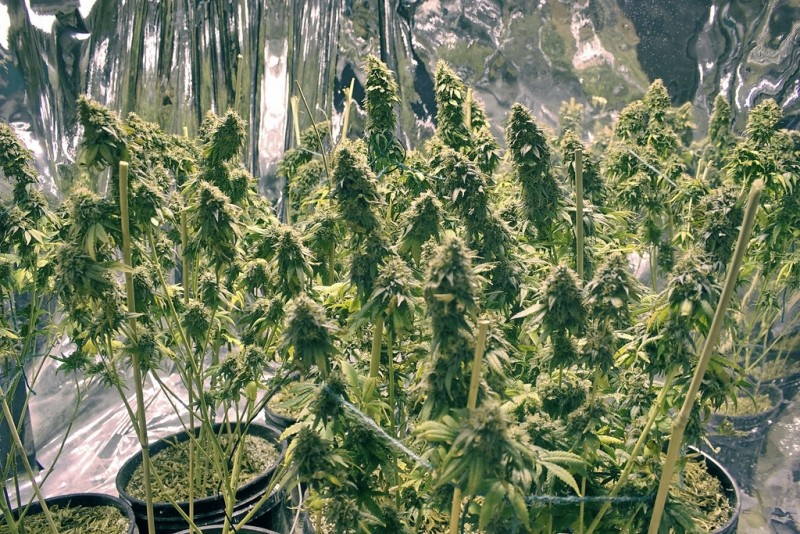City of Fontana Tries to Restrict Californians' Pot Growing Rights, Gets Sued with Help of ACLU
California's Adult Use of Marijuana Act (AUMA) passed into law last year with 57 percent support.
The city of Fontana in California reacted in February to the law, known on the ballot as Proposition 64, by passing Ordinance 1758, which restricts the rights to grow marijuana for personal use granted in that state law.

This week, the American Civil Liberties Union (ACLU) of Northern California and the Drug Police Alliance (DPA) filed a lawsuit in California Superior Court in San Bernardino County challenging the Fontana ordinance.
In Harris v. Fontana, plaintiff Mike Harris, a 61-year-old Fontana resident (and a former union iron worker and registered nurse), claims marijuana helps him with pain resulting from his prosthetic hip and shoulder reconstruction.
Harris wishes to grow his medicine for himself in his Fontana home as is his right under AUMA, but says Fontana's ordinance is preventing him. (The lawsuit notes that local support for the state law was also high, with 53.5 percent of the city of Fontana and 52.5 percent of San Bernardino County voting for it.)
The AUMA does allow cities to reasonably regulate marijuana growing, but also insists that "no city … may completely prohibit persons" from cultivating marijuana "inside a private residence … that is fully enclosed and secure."
The suit argues that Fontana's policies in Ordinance 1758 amount to an illegitimate interference in the rights protected by AUMA. Specifically, the suit claims that elements of the ordinance such as demanding a local permit that costs more than $400, forcing applicants to make "statements that admit to a violation of federal law and that federal authorities could easily obtain," and forcing Fontanans to "submit to (and pay for) a warrantless search of their homes by government agents" are "transparently designed to deny residents the benefits and rights conferred by the AUMA."
The ordinance also forces citizens to "submit to (and pay for) an illegal, costly, and wholly unnecessary criminal database search" in order to illegitimately prevent "some citizens with criminal records from growing under any circumstances."
The suit notes, with many specific examples, that Fontana politicians very clearly stated that the purpose of the ordinance was to be "as restrictive as possible" toward pot cultivation in their city.
Under AUMA, the lawsuit says:
"it shall be lawful under state and local law, and shall not be a violation of state or local law, for persons 21 years of age or older to … (3) Possess, plant, cultivate, harvest, dry, or process not more than six living marijuana plants and possess the marijuana produced by the plants."
Other than limiting the lawful activity to adults aged 21 and over, the AUMA places no further restrictions on who may engage in activities such as possession and cultivation of nonmedical marijuana, and makes such behavior affirmatively lawful under state and local law.
The various requirements to get a permit to grow pot in Fontana, which the suit lays out in detail:
are plainly intended to make it unreasonably difficult and expensive for persons desiring to cultivate marijuana to do so. Many residents of Fontana will be unable to afford to dedicate a separate room in their home entirely to the cultivation of six or fewer marijuana plants, or to undertake the construction necessary to create a separate, locked room accessible by a single door.
Occupants of single rooms, in-law units, studios, one bedroom apartments, and other smaller homes may be denied a license based solely on the design of their homes. Residents who have unpaid municipal fines or fees are also denied permission to cultivate, even though this has no reasonable relation to public health or safety, let alone to the cultivation of marijuana.
The requirement to submit to fingerprinting "for a search in the California Department of Justice's LiveScan criminal records database is an illegal invasion of its citizen's privacy. California law treats its citizens' criminal records as private and only allows disclosure in very limited circumstances," the suit maintains.
A particularly absurd detail in Fontana's law insists that any area growing pot in a residence "not be used to store or have used within it any "[e]xplosive gases," including butane, propane, xylene, styrene, gasoline, kerosene, oxygen, carbon dioxide…"
The suit refers to that as plainly "nonsensical," since "carbon dioxide is present in the atmosphere, produced through human exhalation, necessary for plant respiration, and so famously nonflammable that it is often used as the main ingredient in fire extinguishers and commercial fire suppression systems. It is also used to carbonate beverages; many households have small canisters of the gas in their kitchens so that they can make their own soda water. Oxygen is necessary for human life, and like carbon dioxide, it also naturally occurs in the atmosphere. Accordingly, the City's ordinance purports to ban the storage or use of air in indoor marijuana cultivation."
Harris and his institutional allies, the ACLU and DPA, want to prohibit Fontana from enforcing the ordinance as legally "void and unenforceable" given the AUMA. He is seeking no damages or monetary relief beyond the cost of the suit and attorneys' fees.
He wants Fontana to admit its permit requirements are illegitimate and cannot be enforced under AUMA, and he wants to grow marijuana as medicine under California law without undue interference from the city.

Show Comments (15)